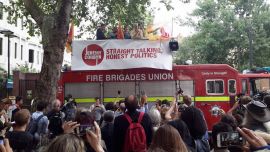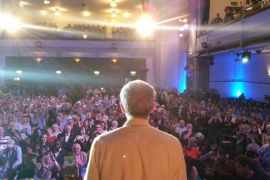Following on from mass rallies in Liverpool, Birmingham, and Coventry in the past week, over two thousand people gathered in Camden, London, last night to hear Jeremy Corbyn speak about his alternative to austerity. It is clear that a new political movement is being forged, providing a point of reference for workers and youth.
Yesterday evening 2,500 people descended on central London to hear Jeremy Corbyn put forward a bold alternative to austerity at the latest in a series of mass meetings taking place up a down the country. The rally was so oversubscribed that despite the main hall of the cavernous Camden Centre being packed to bursting point, two other ‘overflow’ halls were filled with Corbyn supporters, while hundreds more waited outside, unable to squeeze into the building.
Unperturbed by the enormous attendance, Jeremy took the time to speak four times, addressing all three rooms inside, as well as giving a further speech outside atop a fire engine provided by the FBU – the firefighters’ union, which is backing Jeremy’s leadership campaign. Such is the thirst for Jeremy’s ideas that several groups of teenagers scaled the walls of the venue so that they could catch a glimpse of his speech to the main hall through the window.
 Jeremy lucidly described the devastating impact of austerity across Britain, of millions of people forced to rely on food banks, and of a housing crisis that amounted to a social cleansing of the poor from London. He went on to outline his alternative of a society run in the interests of the ‘real wealth creators’ – that is, ordinary working people.
Jeremy lucidly described the devastating impact of austerity across Britain, of millions of people forced to rely on food banks, and of a housing crisis that amounted to a social cleansing of the poor from London. He went on to outline his alternative of a society run in the interests of the ‘real wealth creators’ – that is, ordinary working people.
Corbyn was joined on stage by Owen Jones, who said that as impressive as the campaign had been so far it must not stop here. Owen argued that whether Jeremy wins or loses, this campaign must become a launch pad for a mass movement to change society.
Mark Serwotka, general secretary of the PCS (civil servants’) union, also spoke. He poured scorn on the attacks of the right wing and their patronising attempts to dissuade Corbyn supporters by arguing he was unelectable. At the mere mention of Blair the hall erupted with a chorus of booing, demonstrating the contempt with which the long disgraced former prime minister is viewed.
 The London rally follows on from a 1,500 strong meeting in Liverpool and huge meetings in Birmingham and Coventry over the past week. At the same time, the campaign is coming close to raising it’s £100,000 target for donations, and almost all the main bookmakers now have Jeremy as the favourite to win. Coming on the back of official endorsement from the 1.3 million strong UNISON public sector union, it would seem the campaign is now gaining a seemingly unstoppable momentum.
The London rally follows on from a 1,500 strong meeting in Liverpool and huge meetings in Birmingham and Coventry over the past week. At the same time, the campaign is coming close to raising it’s £100,000 target for donations, and almost all the main bookmakers now have Jeremy as the favourite to win. Coming on the back of official endorsement from the 1.3 million strong UNISON public sector union, it would seem the campaign is now gaining a seemingly unstoppable momentum.
The mud-slinging Blairites
These advances for the campaign come despite a torrent of attacks on Jeremy from both the mainstream media and the right wing of the Labour party. Chris Leslie, Labour’s shadow chancellor, joined the chorus of Blairites flinging muck, with his absurd claims that Jeremy’s economic policies would actually make workers poorer. Completing this rogues gallery of Corbyn critics was former leader Neil Kinnock, who displayed his long established McCarthyite credentials by blaming ‘malign Trotskyists’ for the surge in support for the campaign, as well as deriding Jeremy for being ‘unelectable’. What would a man who lost two elections (because he was too busy waging war against the Labour party left) know about electability!
What is apparent is how utterly discredited these career politicians have become amongst rank-and-file party members, as well as society at large. Instead of undermining the campaign, every attack by Blair and co. only serves to strengthen it. The general feeling appears to be, ‘if Blair is against it, then I must be for it!’
The right-wing leaders and the bourgeoisie press alike are completely insulated from the realities of society. As a result, they fail to understand the enormous seismic shift in consciousness that has been taking place over the past period. Ever since 2008, ordinary people all over Europe and the wider world have started to question the necessity of a system that demands cuts to their living standards to pay for a crisis they didn’t cause.
Millions of working people are yearning for an alternative but, up until now (in England at least), the bankruptcy of the Labour and trade union leadership has prevented this feeling from having an expression. In Scotland, the independence referendum and consequent SNP electoral tidal wave was an expression of this burning desire for change.
Jeremy’s campaign now gives a voice to these same feelings across the UK. This phenomena is not unique to Britain, but is just one example of a general process, as Stella Christou, a Socialist Appeal supporter, quoted in the Guardian, explained:
“New parties and new figures are emerging throughout Europe and now it is happening here. They are shaking the foundations of traditional social democracy. Jeremy Corbyn is bringing together the disaffected, demoralised and apolitical people.”
Who you calling apathetic?
What is most noticeable about the campaign is the huge numbers of young people involved. The media likes to tell us that young people are apathetic and don’t care about politics. But the groups of teenagers pressing their ear against the windows of the Camden centre last night paints a different picture. Indeed, at one point the rally was addressed by a number of campaign volunteers. Almost all of them were under the age of 20 and only recently involved in politics, motivated by a burning desire to fight for a better society. This shows that campaign is drawing in the same layers of radicalised youth who flooded onto the streets to protest against the Tories after the election.
It is becoming clear that we are witnessing the birth of a new political movement – one that has the potential to draw in hundreds of thousands to fight against austerity should Jeremy win. In this respect, it is possibly one of the most significant political developments across Britain in the past period, certainly since the anti-Iraq demonstrations, if not the fight against the Poll Tax. What is most noticeable from the campaign is a sense of optimism and enthusiasm from all involved, young and old alike, something totally absent elsewhere.
Socialist Appeal supporters share this enthusiasm and we are wholeheartedly supporting the campaign for Jeremy to win – but we must not be naïve about what this would entail. If Jeremy were to win, it is certain to open up a civil war inside the party. The Blairites could not countenance such a victory, not because they really believe Jeremy is unelectable, but because the movement he has unleashed threatens the interest of the ruling class they represent in their total commitment to austerity.
The right wing would immediately commence a campaign of sabotage and work to remove Jeremy by one means or another. We must not take such attacks lying down, but be prepared to meet them head on and defend the democratic will of the majority of the party its affiliated unions.
Vote for Corbyn! Fight for Socialism!
In this respect, we disagree with Jeremy when he calls for ‘party unity’. Labour has long been home to two fundamentally opposed camps: those that fight for the interests of working people; and the real ‘infiltrators’, who represent the interest of the bosses. If Jeremy is to act on his programme, it will be necessary to fight against any Blairite sabotage and remove the careerists and carpetbaggers from the Party. Only then can we be truly united in the battle against the Tories.
Should Jeremy fail to win the same battle will still be necessary. We must not allow the thousands who have flooded into the party to become despondent and drop out. We have to struggle to organise them into a force that can continue to fight for a fundamental transformation of society.
In either case, the genie is now out of the bottle. Thousands of people have been drawn into political activity. The mass anger and desire for a radical change amongst workers and youth has now been given a visible, tangible form. Armed with a fighting, militant, and bold socialist programme, such a movement would be unstoppable.
- Vote for Corbyn!
- Kick out the Blairites!
- Fight for Socialism!
“The policies Labour needs to win”
Report by Nathan Taylor
If you passed the Bloomsbury Baptist Church last night (28th July) and saw the queues going round the block you would have thought some kind of rock star or big American pastor was in town. Instead, people were queuing to see an unassuming 66 year-old man. But in the few months since the start of his campaign, Jeremy Corbyn has become one of the most famous people in British politics. One woman I spoke to, a long-standing Labour Party member, said she has not seen this much enthusiasm for a Labour politician in decades. Others in the queue did not even look old enough to vote; and yet here they were at a political rally having heated discussions about socialism.
Inside the venue there was a buzz of anticipation, with 800 people crammed into every corner available. On the stage, London mayoral candidate Diane Abbott, who was the main speaker alongside Jeremy Corbyn, sat patiently as the other speakers said their piece. Among them was Andrew Berry of Unison, who was there in a personal capacity, Labour councillor for Islington Claudia Webbe, and Christine Shawcroft from the Labour Party National Executive Committee. The message from all the speakers was very clear: there needs to be a united anti-austerity movement at all levels – in the city councils, trade unions, and in parliament.
When Jeremy Corbyn finally arrived there was a big cheer and standing ovation, which ended up cutting down Diane Abbott’s speaking time. Abbott gave a good speech about changing London from being a playground for the wealthy elite to a city where everyone can afford to live. The policy that got the loudest round of applause was to introduce rent caps and build more social housing, an issue of particular importance for Londoners.
When Jeremy Corbyn stood up to speak, accompanied by yet another standing ovation, there wasn’t much left to say on specific issues, as all the problems of austerity, welfare, housing, workers right, etc. had been covered by the previous speakers. In essence Corbyn’s speech was a general idea of the kind of leader he wanted to be and the kind of country he wanted Britain to become: namely, a leader who will take a principled stand against injustice and a Britain that existed for the benefit of the many and not of the few.
In particular, Jeremy stressed that he was not interested in identity politics, one-upmanship or petty squabbling on Twitter. His calm, collected demeanour and straightforward answers to questions are all part of his appeal. At the end of his speech, everyone in the room stood up clapping and cheering and there was a buzz of political discussion as people funnelled out into the streets.
The enthusiasm for Corbyn is extremely contagious and the energy from the layers of radical youth that have been drawn to the campaign makes it particularly exciting. However, it is important to take a step back and observe some of the flaws in Corbyn’s programme. The one that bothered me throughout all of the speeches was that, somehow, a Labour government will need to fund all of the proposed social reforms and restructurings. The answer from all the speakers was to close the tax loopholes that have for years been exploited by major companies doing business on British soil. However, this is no simple task; French president Francois Hollande promised something similar, but when he tried to close France’s tax loopholes the big companies were quick to find new ones. As a result, Hollande ended up having to implement austerity, despite his election campaign promises.
Despite these limitations, there is no doubt that the Corbyn campaign is giving British politics the kick that it so seriously needs. For one thing, it is bringing left-wing ideas back to the public consciousness. Here we have a politician going on mainstream media outlets, talking about nationalising public services and taxing the rich, and it being discussed as a serious alternative for the future of Britain. This has not happened in decades!
As Marxists, we support this campaign and the reforms to improve the lives of the working class that Corbyn offers. However, we must also point out the limitations of Jeremy’s programme, as mentioned above. If recent history has taught us anything, it’s that progressive reforms on a capitalist basis are not possible. The ongoing crisis of capitalism has destroyed the material basis for the reforms that were won through struggle in the past. The Tory attacks on workers’ rights, social housing and the NHS are all testament to this fact.
A simple anti-austerity programme is not enough. To make real, lasting change what is needed is a break with capitalism and the rebuilding of society on the basis of a socialist programme – to nationalise the banks and big businesses, and to bring these together under a common plan of production in the interests of workers and youth.






